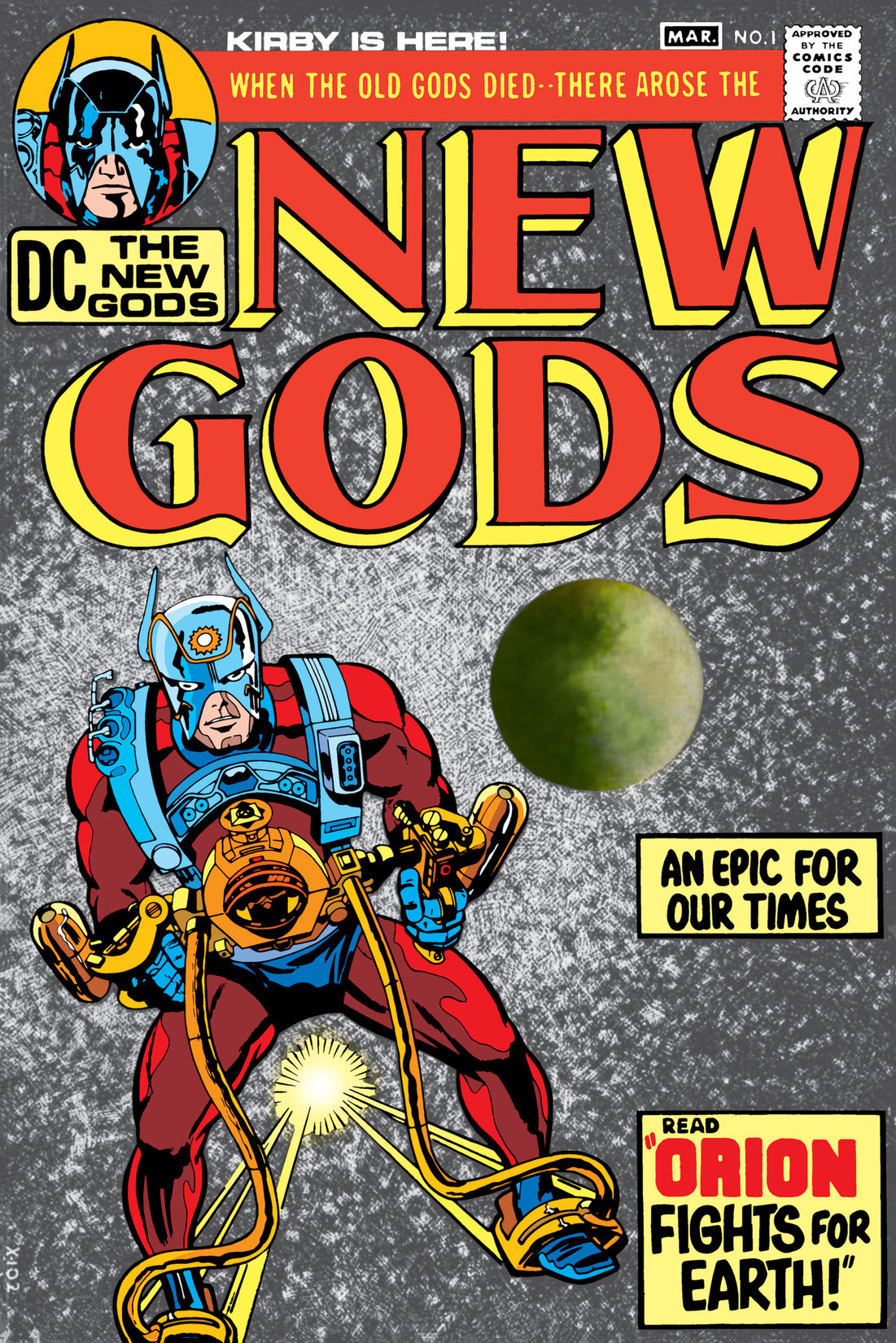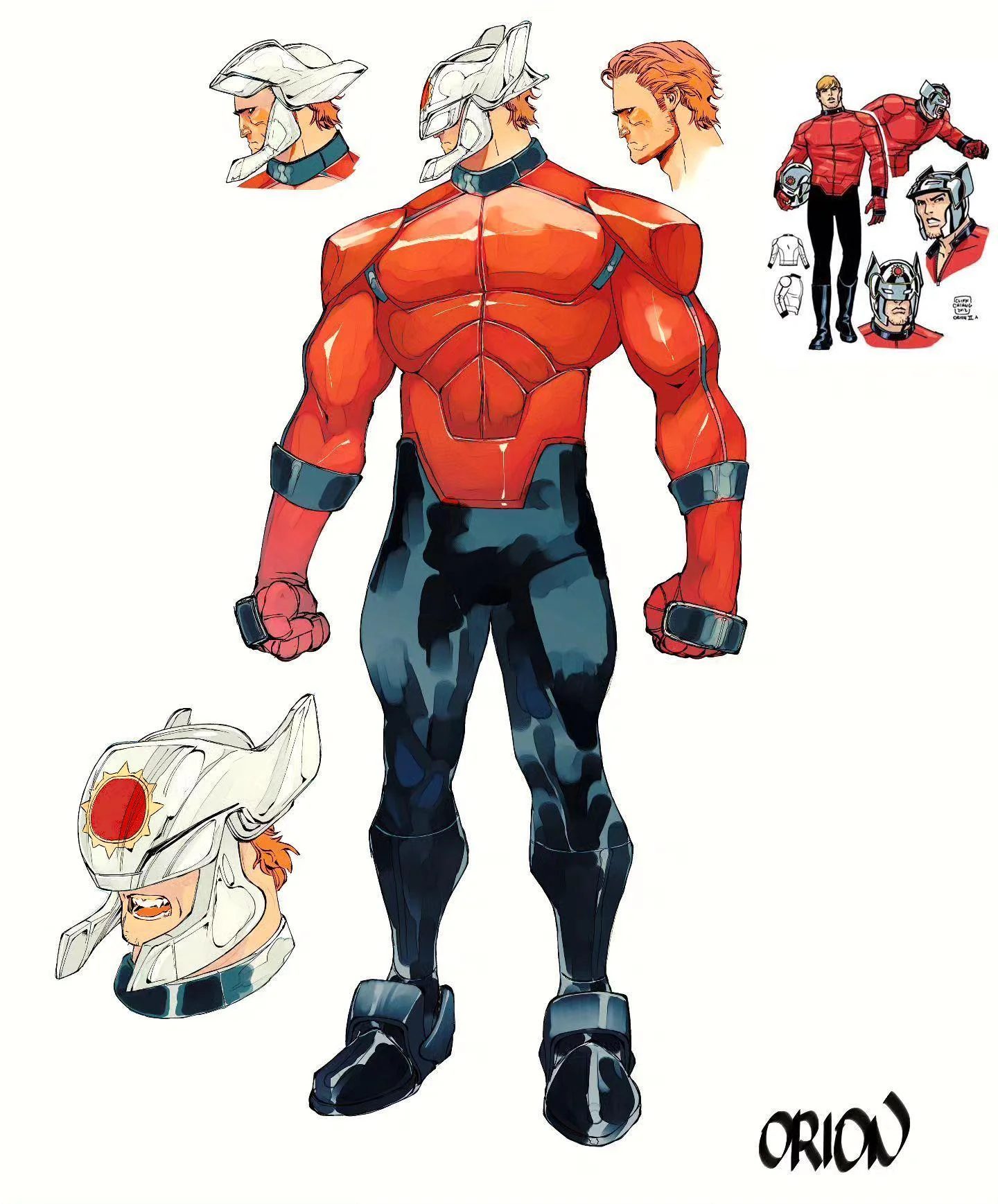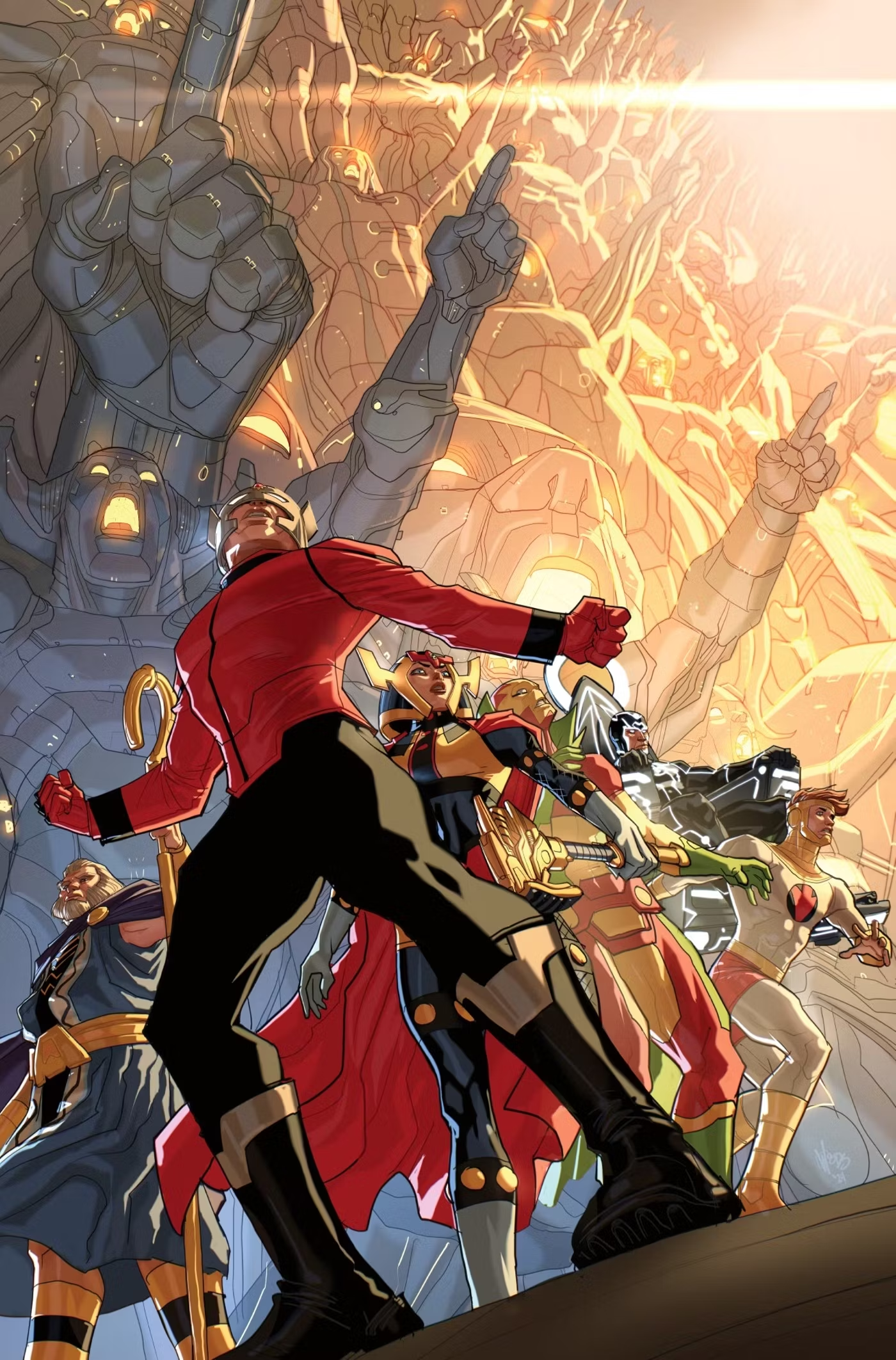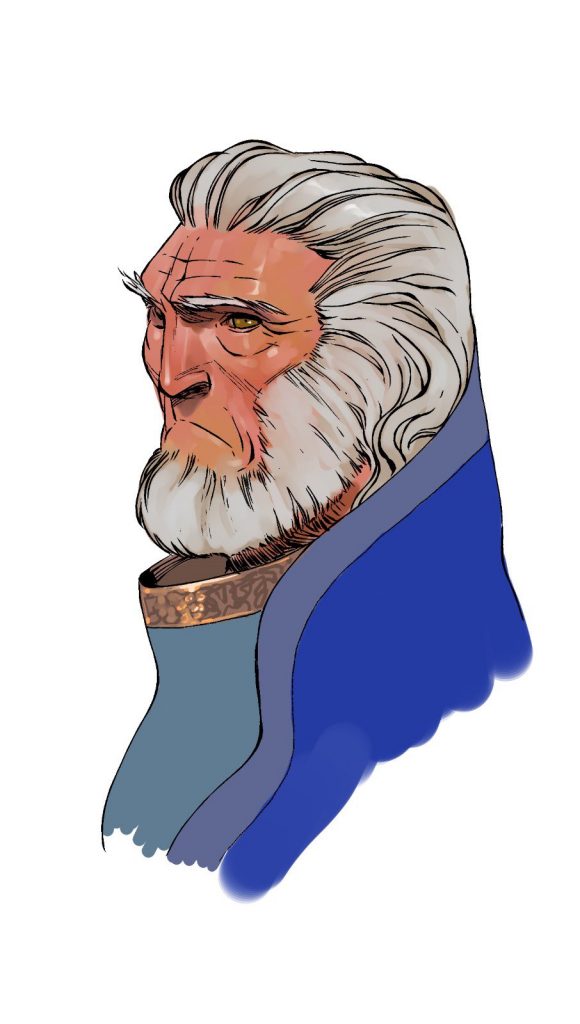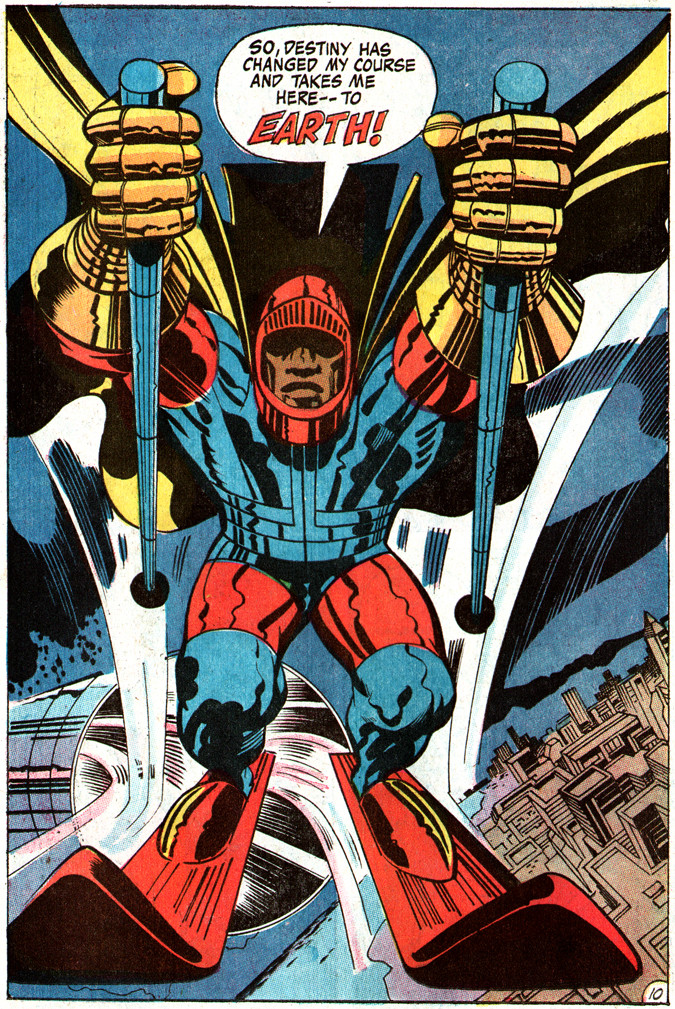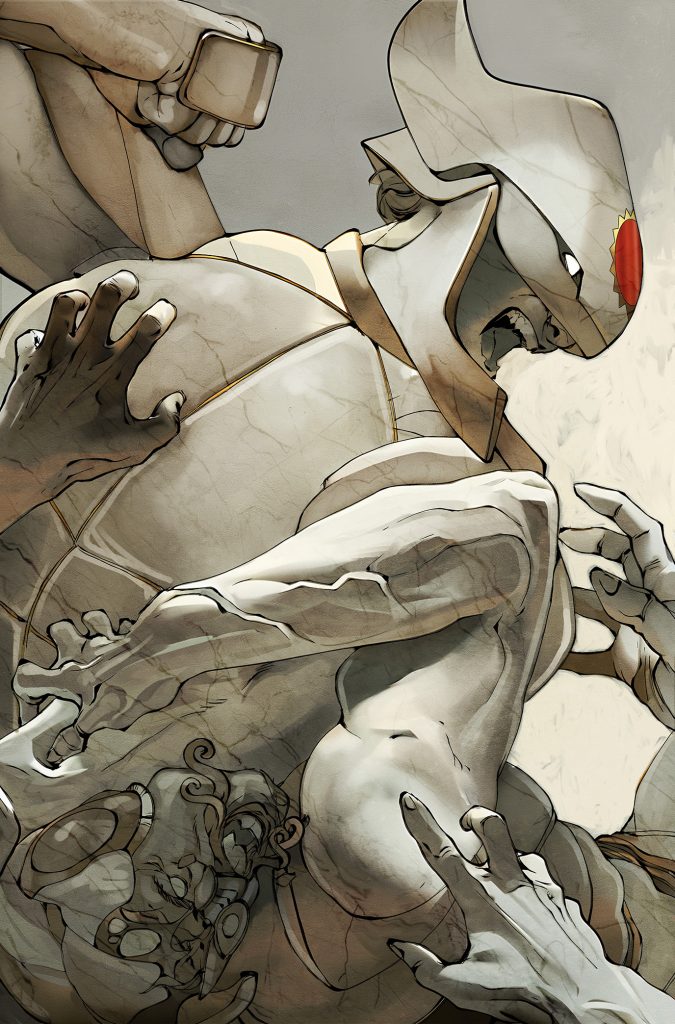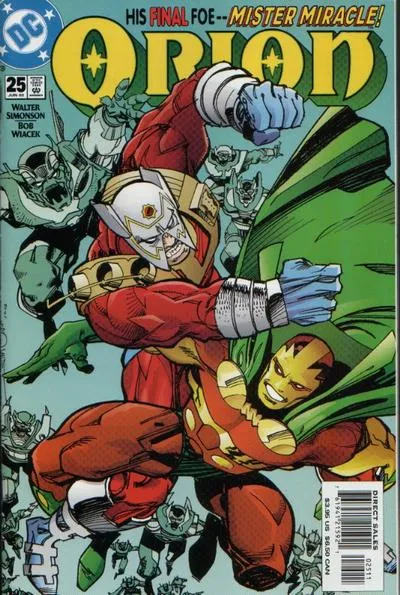“Kirby Is”: Ram V and Evan Cagle on Resurrecting and Recentering the New Gods
When writer Ram V first told me he was going to be relaunch the New Gods with artist Evan Cagle at DC as part of the publisher’s larger All In initiative, my internal dialogue was something like the following.
“Wow! That’s an inspired creative team! Evan and Ram work so well together, and I bet they’ll do something really interesting with the New Gods.”
“Wait, a New Gods book? With Darkseid at the heart of that whole All In/Absolute effort? That seems like it’s going to be an important series for the larger DC story.”
“Jeez, that’s going to be a challenging one for those two. Resurrecting the title in Jack Kirby’s Fourth World and trying to figure out how to make it work at the heart of the larger DC universe will be quite the task.”
All three of my reactions were true to some degree. Yes, Ram and Evan are doing something interesting with this New Gods title that’s going to launch in December. Yes, it’s going to be an important series. And yes, it’s going to be a challenging task for the creative team behind it, if only because the New Gods as a whole have largely operated on the periphery of DC 1 and Kirby’s work carries a long shadow. But the good news is, there are few writers in comics more adept at taking on a project like this and making the most of it than Ram V, and there are few artists better at building on an idea and finding something even more to it than Evan Cagle. If anyone’s going to make this work, and work to the absolute max, it’s going to be them.
So, when Ram asked if I wanted to talk about this series and their plans for it, my answer was naturally, “Of course!” I had to know how they planned to make maybe Kirby’s biggest idea sing in 2024, and how they were going to do that as part of a larger line-wide effort. So, recently, we did just that.
I hopped on Zoom with the creative team behind the upcoming New Gods title and talked with the pair about a little bit of everything related to the series. What their personal Kirby and New Gods backgrounds were. How that feeds into what they’re doing. The origins of this project. Translating these ideas for today and themselves. Figuring out what a New Gods book is when it’s at the center of the DC Universe. The design of this world. Other collaborators on the series. Taking on Kirby. There’s all that and more, including a recurring bit involving the Black Racer’s skis. It’s a sprawling chat with two of the best in the game, one that’s all about how they’re finding solutions for this gargantuan effort, and doing so in the fashion that fits them and the story best.
It’s been edited for length and clarity. It’s also open to non-subscribers. Also, if you enjoy this interview and would like to read more like it, consider subscribing to the site for more features like this and to support the work.
I want to start by establishing where you two were heading into this project. What level of Fourth World/Jack Kirby aficionados were you before lining this project up?
Ram V: I would put myself as an enthusiastic casual.
I like that.
Ram: I had read some of the original Kirby stuff. I had looked at a lot of it, because it’s Kirby and you look at it and you’re like, “Whoa, what is this?” Obviously, I knew of the characters that had been pulled into the more mainstream consciousness of DCU, the Darkseid, the Orions, the Mister Miracle of it all. And so, I had a fairly cursory viewing of all of these characters. And I had seen some of the Kirby stuff. I’d certainly read a little bit of Simonson’s Orion, and had also read a few short pieces from, I think there was an anthology collection called Stories of the New Gods or something like that. Which had some interesting creators on there. I think there were stories from Frank Miller and Mike Mignola in there.
Does that make me an enthusiastic casual?
You have me beat. (Ram laughs) Evan, where were you at, above or below?
Evan: Maybe…just tangential? (David laughs) My experience with Kirby was with none of the things that he’s best known for, because of this collection of comics that I bought when I was a kid for $30. This guy was getting rid of all of his long boxes and he had all this old stuff. I think 1981, 1982 was the latest that he had in his collection. And so there was Kirby stuff in there, but it wasn’t any of the big stuff. I think it was Pacific Comics. It was one of those sort of comic publishers that he was doing shorts for. He would have a single-issue short story, and I guess the comic collector that I bought this thing from was really into all these sorts of horror and sci-fi short things.
And so, all my Kirby knowledge is in this very specific little corner of the Earth, after he did everything that anybody else knows him for.
Even before you signed up for New Gods? You hadn’t gone back and read anything before then?
Evan: No.
Ram: Evan didn’t actually sign up. He kind of got volunteered. (Evan laughs)
Evan: I got volunteered based on my enthusiasm for it. There’s some sort of indentured servitude happening. (Everyone laughs) I was just told to show up at this one Home Depot at eight a.m. and there was going to be a job there for me.
Was your training on this Ram having you on Zoom and he would bring up screens that just shows characters as he said, “This is Granny Goodness.”?
Evan: Little bit yeah. A little bit. (David laughs)
Also, even though we haven’t talked in years, I’ve known (artist) Nick Derington since we worked together on A Scanner Darkly. Nick is a Kirby enthusiast. I knew of these characters through other people. But my firsthand knowledge of it was non-existent. And then Ram was like, “Here, you should read 300 pages of the most mind-bending stuff you’ll ever come across.”
Ram, why did you volunteer Evan for this role?
Ram: Actually, my thinking is much more mercenary and tactical and logical than me going, “I love Evan’s work.” Yes, I love Evan’s work.
You love a lot of people’s work.
Ram: I would never suggest someone for a project if I didn’t feel like they were bringing something only they could bring to the project. And I think the stories that I had in mind for this was something that felt big. It has to feel big. These are gods. These are not just superheroes. And so, Evan’s one of the few people that I feel like can very easily transmit the idea of big on the page. And I don’t know that there are a lot of other people who can do that very well.
It’s part of the reason I love Mœbius as well. You can look at a single Mœbius image and just get a sense of scale and wonderment that just feels like the world extends outside of the boundaries in the page. And to me, Evan’s art has always felt like that. And then add to that Evan’s sort of unique ability to portray the most tiny, intimate emotion on the panel. So, you have someone who does, “Boom, this is 16 worlds all in a spread. Have a look at that. It’s amazing.”
And then a panel in there of like, “And this person is contemplating the death of one of them. Boom.” And you don’t have to explain any further than that. And that’s very difficult to find in someone’s work, whereas it seems like Evan does that with his left hand. Unless you’re a lefty, then it’s your right hand.
Evan: I thought it was my reluctance. (laughs)
Ram: No, negging doesn’t work on me. (laughs)
Evan: Several times before this started, I’ve been like, “But why me? This is not my world. What am I doing here?”
Ram: But it also goes back to what we were talking about earlier today. I was showing him some of the pages from my project with Anand Radhakrishnan, and Evan was very excited by them because he was like, “This doesn’t look like a superhero comic.” Don’t get me wrong, it’s Anand doing superheroes. But it doesn’t look like what you would expect to see in a superhero comic.
Evan: It didn’t have the same language that everyone is sort of used to seeing in that sphere.
Good job by you, Ram. Evan is inspired, at least in part because…I’m going to tell you about my background. I am an interesting test case for what you’re going to do. I have not read any New Gods series. I’ve read them in a lot of books, like Cosmic Odyssey, which probably counts as a New Gods-ish book. I was just reading Rock of Ages, the Grant Morrison and Howard Porter JLA story that has New Gods stuff in there. I’ve read around the periphery. I’ve read stories that feature these characters.
Ram: I’m sure you’ve read Seven Soldiers, and that has some New Gods stuff in it.
The New Gods are really famous. Jack Kirby’s really famous. The history of New Gods titles is lengthy. But it’s all over the place. Even Kirby’s first volume only ran 11 issues. And so, you’re going to have a mix of hardcore fans who absolutely worship this stuff, and then you’re going to have newcomers like me. I would say the latter outweigh the former even more than you’d have on other new titles.
Ram: My expectation certainly is that a lot of new readers are coming into this. And I feel like with anything I’m doing, the endeavor should be to bring new people on board.
There can be a tendency with Kirby creations where creators revere the guy and the work so much that you kind of treat it like a museum exhibit, one that you don’t want to harm. I’m not saying you two are going to harm these characters. But maybe not having that same emotion tied to it will allow you to be a little bit freer with the story, if you will.
Evan: That’s what I would tack onto the end of what I was saying before. Maybe the thing that recommends me in Ram’s eyes is that this isn’t my particular sandbox. So yeah, just as an addendum to that, maybe having less of a museum curator approach to it is for the best.
Ram: And I think these things tend to happen with bigger creators. Mike Mignola did Hellboy, and then for about five years after Hellboy reached its peak, everyone was trying to draw comics like Mike Mignola. James Harren burst onto the scene, and suddenly you had a whole bunch of Harren lookalikes. I think the same is true with Kirby. Kirby’s work is so influential that the first instinct is to come and go like, “Oh, I get to do Kirby. I’m going to do it like Kirby.” And I wanted someone who doesn’t feel that way. I don’t feel that way when it comes to the writing of it. Because I love the old New Gods stuff, but it still reads dated to me now. Purely in terms of the way I look at how it’s written. The ideas are fantastic. The plotting is fantastic. But I think we read and appreciate comics in a different way now than we used to when those were coming out.
I love evolution. I don’t love homage. I don’t love nostalgia. I don’t love…reverence is the right word you used there. In fact, very recently I was talking in an interview about, do I feel intimidated by taking on Jack Kirby’s legacy? And I was like, “No, not really, because stories should change and they should be altered, and they should have a life of their own long past whatever their creator intended for them. Because they’re the seeds of new ideas that other people will come and treat in their own way.” So part of the reason I took on New Gods was exactly that. It felt like there were seeds in there that I could say, okay, let’s make a cool story with these characters in 2024, and in the way Evan and I would rather than have anything to do with revering Kirby, if you will.
When I was prepping for this, I read a lot of background on the characters, and your line about seeds reminds me of something I thought of as I read about these characters and stories. Everything I read about…I honestly feel like I could read an entire miniseries about Granny Goodness’s Terror Orphanages. Just that phrase is interesting to me.
Evan: Yeah. Say no more.
“I want to read about the Terror Orphanages.”
I’m guessing your comic is not about the Terror Orphanages.
Ram: But that’s the thing with the original New Gods stuff. Evan and I have talked about it several times over. It’s so much the product of someone whose brain is, A, just bursting with ideas every two panels or so, and B, has no filter in terms, “Do I use this idea here or not?” (David laughs) Because none of those ideas, in my opinion, are explored with any kind of persistent depth. Some of them are. The big sort of fatherhood beats, the big sort of politics beats and feudalism between planets, etc. But Mother Boxes…it’s an idea and it’s just there. And what is a Mother Box? Why is it called a Mother Box? And you might find references to it here and there, but if you really got into it, that could be a whole story on its own. I find that the original material is full of stuff like that. And so, there’s a lot of room for depth.
Evan: It’s so rich with ideas that anyone coming after Kirby playing in that same sandbox has their pick of the litter. You can construct a story based on like ideas with a particular tone, if that makes sense. So yeah, if you wanted to focus on the weird tech as your angle into a story, you could choose that path and never contradict anything that Kirby’s done without having to get into any of the other stuff. And I feel like you could do that with almost any element of it. The fatherhood angle, the colonialism angle, any of that stuff. And altogether, it’s like, “Wow, this is a crazy mishmash of all these different ideas, and they don’t always work together.” In places it’s super uneven, but if you like any one of those ideas, you can find another one like it 10 pages later to breadcrumb you along.
Now I want a POV issue that’s from a Mother Box’s perspective. Finally, we get to find out why they ping. (laughs)
How did all this, the evolution and all of that, factor into your pitch? Because from what I understand, Ram, this has been in the works for a few years.
Ram: I made the original pitch three years ago, and frankly, the pitch was the easiest thing. I’ve read a lot about Kirby and where he took his inspirations from, and there’s a lot of world mythology involved there. There’s a lot of reference to the usual places, the Greco-Roman mythology of it all. But he also took bits and pieces from all over the world. I grew up with Indian mythology, and so I wanted to do something along the lines of…every great mythology has its eschatology myth, 2 like Ragnarok or whatever equivalent in other mythologies. Indian mythology has an eschatology myth as well, and the structure of it particularly lends itself well to doing a New Gods story that involves main line DCU in a proper way. And the moment I saw that, I was like, “Okay, that’s what I need to do. That’s my structure. That’s my big thing.”
So overall, that will be the bigger picture story of it all. And then the individual pitches, they kind of write themselves. The relationship between Orion and Mister Miracle, the history of that and where that evolves to. And then one other thing that was part of my pitch, and I think this goes back to why the New Gods have always felt like this. It sits beside everything else in the DCU, but it’s also kind of peppered into everything that has happened in the DCU. And so, I said, “Let’s stop dancing around the thing and pull the New Gods narrative firmly front and center into the DC mainstream narrative.”
I think people will find that this book becomes quite central to what’s happening in pretty much all the other books.
Traditionally when I see New Gods characters, it’s them showing up in other books. It’s Orion being a hero or Darkseid causing problems or this or that. And because of All In and Absolute and Darkseid’s position in all that, it seems like it’s centered the New Gods in an unusual way. How do you feel that changes the book? Does it existing at the epicenter of what DC is doing as a whole shift what the book is and perhaps needs to be?
Ram: Well, there was one particular change that was suggested to me maybe a little bit more than a month ago to bring this book sort of bang into the middle of it. And you know how these things are. I’ve been talking to Scott (Snyder) and Mark Waid and Josh Williamson and Tom Taylor and all these guys, and sometimes you need someone who has not seen everything to come in from left field and give you an idea. Someone at DC came in and said, “But what if we did this?” And all of a sudden it made sense.
I always find it very funny when people think for some reason that I’m this writer who doesn’t want any kind of interference, and that my stories should exist in a vacuum. No. Come on. I’m in comics. (David laughs) They should be tainted by every single thing. Every single thing somebody else does should somehow bleed into this. That’s the whole point of writing comics. I love that stuff. I love it when stuff comes in out of left field. I love it when something that happens in one book has to show up in another. The only thing I say is, “Great, but you let me figure out how that’s going to affect my book.” And so that’s what happened. There was this big suggestion saying, “What if we did this?” And I said, “Great, we can do that, but you let me figure out how we get to that point.”
In that sense, I’m quite excited by it. I think it’s about time. There’s this whole quite literally multiverse of characters just sitting there on a shelf doing nothing. It’s quite exciting to bring them in and go like, “Nope, it all matters now, everything everyone does matters to all of the books.”
Evan, are you learning a lot of new characters now because you have to draw them?
Evan: I am. Every day is a new trip down the rabbit hole. (David laughs)
Ram: Also, Evan, isn’t it exciting to be able to take all these characters and go like, “Cool, this is what we’re going to do with it?”
Evan: Yeah. I mean, really, (Kirby) has some amazingly strange character designs and the character designer in me loves them. I just can’t wait to get my hands on them and to play with them and to make them make sense to me in the way that they make sense to him. Some of them are just…
Ram: Bonkers.
Evan: Your own sense of good taste would be like, “What are you doing? No, he doesn’t have skis. Are you insane? He doesn’t fly through space on skis.” (Ram laughs) And yet Kirby is like, “No, plainly skis are the answer.” Now I have to make that make sense to me, and that’s fascinating.
Ram: Yes, absolutely. Also, surfboards were taken. (laughs)
Apparently if you’re going to travel through space, you have to have a mode of conveyance that is a recreational activity on Earth.
Evan: My first question to Ram was, “Would it be possible for him to be on a snowboard?” (laughs)
It’s too similar. Maybe a little more modern. Rollerblades.
Evan: No, my goal wasn’t to do a Poochie or anything. (laughs) I wanted to just make him sort of like a photo negative of the Silver Surfer so I didn’t have to draw skis. But now I have to think about skis. And that’s something that if Jack Kirby were not so interesting a creator I would not have to do. And I love it.
Ram: And also, I want to add to that, I think we have a very exciting solve to that design. I’m super excited for people to see what we did.
Evan: It does not involve rollerblades. It does not involve a snowboard.
The Black Racer fans are just dying to know the answer. (Ram laughs) The Black Racer Hive out there.
Evan: All will be revealed.
All will be revealed.
That’s one of the things you have to do though. If you’re trying to evolve, the visual evolution has to come too. Like with Orion. I saw a thread of people analyzing the helmet that you did for Orion, Evan, which is different than his regular helmet. And they were discussing this helmet, and I was just like, “This is a lot of conversation about a helmet.”
Evan: I’m really glad I’ve not read that. (laughs)
Ultimately, though, how do you decide which characters need a fresh coat of paint and which don’t? And what guides you as you’re figuring that out?
Evan: It’s basically just…does this character design land in an area where I think it’s…God, I don’t know. To say, “Do I think it’s okay as it is?” makes it sound sort of cheap, and that’s not exactly right. But I’ve got an idea for the way the book looks in my head and it doesn’t all require a fresh coat of paint. And so, it’s just on a case-by-case basis, how well does that jive with what I’ve already got going on in my head?
I will never get over the skis thing. But some of them are really out there and I have to be like, “Okay, how can I retain the sense of who and what this character is without straying too far?” I hope I did an okay job with Orion. I like the design. I like where his helmet went, regardless of what anybody thinks.
They liked it. They were just surprised.
Ram: I go back to something (writer Brian) Azzarello said once in conversation. “If you’re not pissing at least some people off with what you do, you’re probably not trying hard enough.” Which is really good. I think being a ubiquitously liked creator is probably less meaningful at least in terms of creating than to be someone who inspired but also challenged people. Excited, but also angered people. I think that kind of creative work and that kind of response kind of go hand in hand. I don’t know of any single creator that I love who is just ubiquitously loved.
If you look at the most popular creators, every single one of them has made people incredibly mad at some point in their career. I mean, think of Tom King. I swear, we’re always overcoming a backlash to that guy, and yet he’s still one of the most popular and successful writers out there. So good job by Tom.
Evan: It’s really weird. If there’s nothing but backlash, you would think, “Where is all the backlash coming from?”
It’s the unique comic world where they’re overcoming their emotions about change. They’re mad and then they start to understand it and then they love it. It’s a process.
Ram: I also feel like the backlash is usually from people who feel strongly enough about it to take time out of their day to get onto a platform on the internet (Evan laughs) and express your opinion about a fictional character. And I guarantee you about at least half the people reading will never bother doing that, whether they love the thing or hated the thing.
I think it’s way more than half.
Ram: So, I think the internet kind of amplifies voices of both adulation and denigration, and so both of those should be taken with a heavy pinch for salt.
For sure.
Evan: I would never intentionally piss off an audience. That’s not my goal.
Well, you have to do what you think is right for the job. Even if it is messing with Metron, who is my favorite New Gods character. Be nice to his chair, Evan, please. His chair is very important.
Ram: Oh yeah, his chair was a point of discussion as well. (laughs)
I bet it was.
Ram: Have I got a surprise for you.
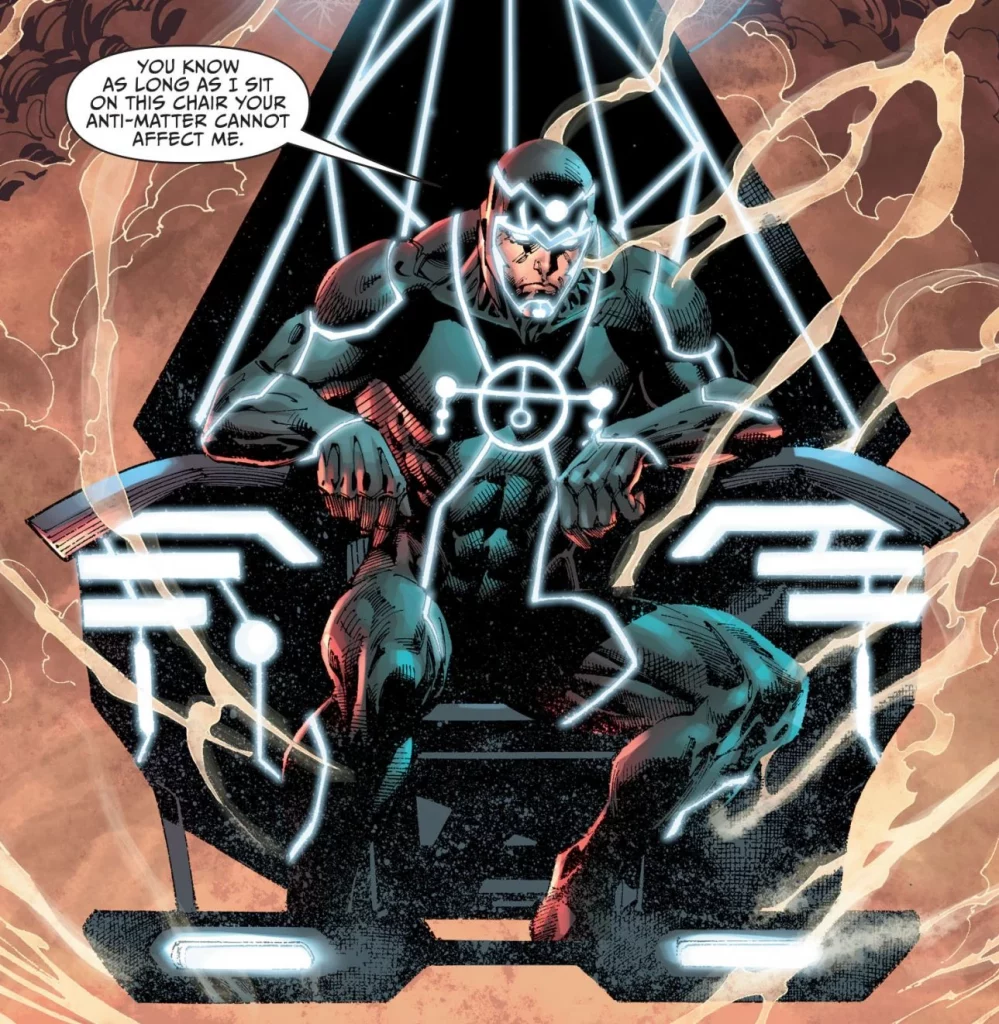
I’m excited. He’s now on a La-Z-Boy. (laughs)
Evan: No, it’s so much better than that. So much better.
Ram: Metron sits down on his chair, punches this impossible combination of keys on the armrests, and then the footstool comes up. (laughs)
Evan: Finally, now I’m ready to recline across space. (laughs)
So, Evan, when I brought up the design idea, you thought that maybe Ram could answer it too. That does make me think that you two are collaborating closely on this. How are you two working on this?
Ram: Just to go back a little bit to the designs, I think the way I see it is the book is very much of Evan’s making.
Evan: Oh, now it’s my book.
Ram: When you read it, hopefully it screams of my work. But when you look at it’s going to look like Evan’s work. And I think part of the joy of working with someone like Evan — and I try to mostly work with collaborators who feel this way — is hopefully all my collaborators have their own language. You look at an Evan book and you know the language of what that is. You look at an Anand book and you know the language of what that is. And I think all these characters, whether they are heavily redesigned or very lightly redesigned, they’re all redesigned so that they fit within the language that Evan is speaking.
Evan: You said that so much better than I said it.
Ram: That is very exciting. This is how I think about it, genuinely. In my brain I go, “I want to use this character.” But then there’s also a second voice that goes, “I really want to see what this character looks like when Evan redesigns and draws this character” because I think Evan’s art is very contemporary. It’s a very 2024, very here-and-now artwork, even though it takes classical influences from a lot of different places. It feels very of the time. And so, I’m very excited to see these characters being pulled into the present, if you will.
In terms of how we collaborate…I would say Evan and I are friends first, so working on Dawnrunner and working on this doesn’t feel any different in terms of the collaboration to me just because I love talking to the guy and there’s a free back and forth of ideas. And some of them will get shot down outside of the two of us, but at least in that moment where they exist between the two of us, they are very cool, very exciting, very encouraging.
You were saying Evan is very 2024. The thing I really like about Evan is his art doesn’t feel like anybody. That’s one of the things that makes me excited about this, but also, I like the fact that you two are talking about story ideas and talking about visuals and not just strictly being writer and artist. Kieron Gillen had this line about how he and Jamie McKelvie were a faux cartoonist, where their powers combine to make a singular entity. What you two are doing here and what you did on Dawnrunner reminds me of that concept.
Ram: Hopefully it’s felt that way through at least all my creator-owned work. I love collaborating with people on that level. And I’m very thankful for the fact that people like Evan, Anand, Sumit (Kumar), all these guys trust me enough to be like, “Okay, if Ram says this, I will give it some measure of consideration.” Because my feedback isn’t like, “Can we make these colors pop? or “Can we make him 50% burlier?” No, my feedback tends to be a little bit more thought out, a little bit more collaborative, hopefully. And so I think developing that kind of trust leads to work that would feel unique. I don’t think Dawnrunner reads like any of my other works, because it is a book that is made with Evan, and I don’t think Blue in Green reads like any of my other work, because it’s a book that is made with Anand.
Evan: When I look at the stuff that you’ve done with other people, I wonder how it was made. It doesn’t seem like the same process that you and I go through, even though it has to be. It must be. And yet those books feel so alien to me. I read (The Many Deaths of) Laila Starr and it just bowls me over every time. Or I read Grafity’s Wall and it bowls me over every time. I’m like, “How is this thing real? How did it come about?” And I’m like, “You know how it came about. You do the exact same thing with him every Tuesday or whatever.” So yeah, intellectually I know the process. But the other element, the second person, is somehow where it all comes together and makes a third thing.
They’re like little marriages.
Ram: Yeah, it’s like a band. Tool sounds different than A Perfect Circle, which sounds different than Puscifer. But it’s all that Maynard Keenan in it with different people. And depending on who you’re playing with, your music should sound different.
Well, and with New Gods, you’re bringing in guest musicians. You’re going to have guest artists. What can you tell me about that?
Ram: Jorge Fornes will be drawing the first issue alongside Evan. But when I say alongside, maybe not every issue, but certainly a lot of the issues have these sequences, four pages or so with story reasons as to why they exist. But they have about four-page sequences of other artists coming in and drawing, but in a style and a language that feels like an evolution of what Kirby was doing with the book. I think so much of New Gods, the designs, the language of the book, is tethered to the way Kirby drew things and the way Kirby presented things. And they were so influential in how comics looked after Kirby.
The instinct is to just do homage. But I didn’t want that. I wanted people whose work I could look at and go like, “Ah, I see you’ve taken this thing from Kirby, but you’ve done entirely your own thing with it.” And so, we’re getting a whole bunch of artists, people whose work I think is an evolution of Kirby’s, but also people whose work I just love and enjoy who are coming in and bringing their flavor to about four pages every issue.
When I first read about what you were doing, the first book I thought of was Kieron Gillen and Esad Ribic’s Eternals Run. It’s also to some degree about how do you evolve past those Kirby ideas? And I do think it’s interesting that maybe the best stories featuring Kirby characters like these have been the ones that have pushed and evolved from the original idea. Even Paul Jenkins and Jae Lee’s Inhumans was a good example of that. It’s about finding your own angle, and it’s going to be interesting to see how you two do that.
Evan: I think for me, seeing other people try to do New Gods in particular, and seeing people try to bring it up to date or make it make sense somehow to a modern mind, to put perspective grids on everything and call it real…that has really shown me what a futile endeavor that must be. It just doesn’t seem to be worth it. It seems to me like the only way that you can have a real conversation with Kirby is to try to match his crazy. To try to be like, “Okay, well what can I do that is also going to plus this and make it visually so interesting that people will be compelled to read it?”
I’ve done a lot of research in the last few months on the New Gods and have seen other takes that other artists have had and felt like some were more successful than others. But the ones that were successful were the ones that I think eschewed this idea that the skis have to make sense in the world, that all of this stuff has to be sort of…
Logical?
Evan: Yeah, modernized in a way that makes it all make sense. Because I think ultimately, if you appreciate Kirby, you’re not in it for the sense. You’re in it for the sensation.
Ram: I’m going to take the opportunity to be pithy here and go, “Well, how does Darkseid do all of this? How does he punch planets?” Darkseid is. And so when you come to like, “Why are there skis? Why is this guy in a chair? What’s happening?” (laughs)
Kirby is.
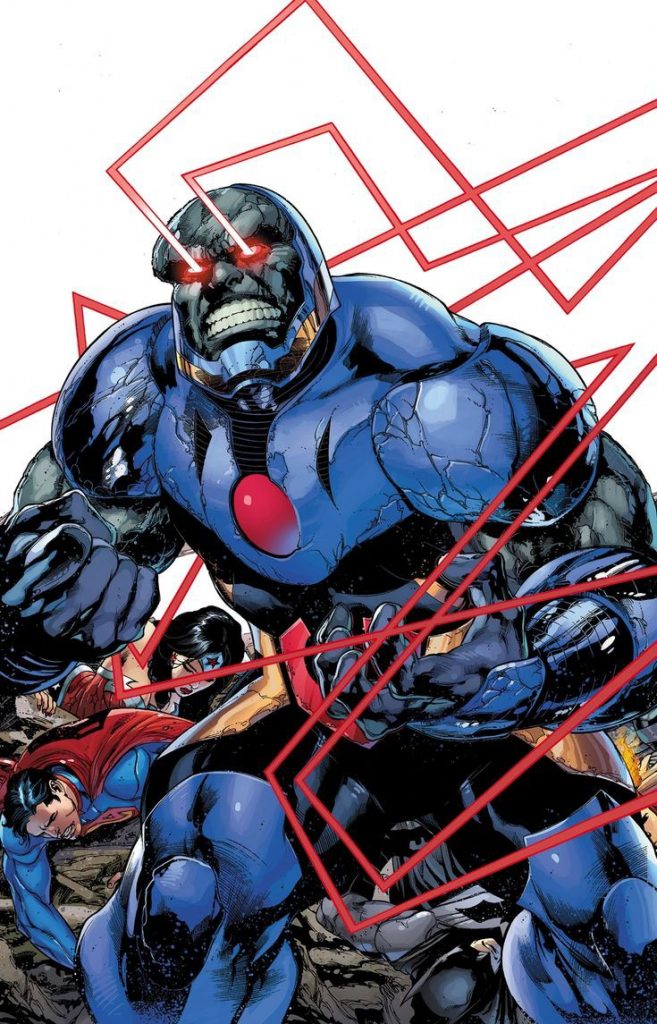
Yeah, absolutely. What even are the finder beams that lead to the Omega Effect? The beams that wrap around your body before they send you back in time or kill you or whatever. How do you make that make logical sense?
Evan: And look, if you’re flummoxed by that kind of nonsense then you’ve got no business digging into this world. That is the superstructure underneath Kirby. It’s all spaghetti that leads to space.
Ram: This comes to a point of personal interest for me. When anyone tries to take on something from comics that was bizarre or cool or didn’t make sense or it was weird, there’s this tendency to try and explain it. And then you try and make a system out of it. And it’s a very post Dungeons & Dragons tendency of like, “Oh, what is the system? How does this work? What are the numbers? What are the power levels?” And I have zero interest in that. (David and Evan laugh) I could not more bored with that idea.
Evan: It’s similar to what film does with comics. It tries to translate spandex into body armor. It tries to put seam lines on everything so it’s visually interesting. And it’s like, “Alright, well, that’s not really what we’re talking about. But you do you.”
You have to be able to embrace it.
Ram: I feel like the joy of comics is that it is uncontained, unbridled storytelling. And the moment you try and create these systems and make everything make sense, you’re containing it. You’re putting it in a box so that you’re like, “Cool, everything makes sense inside this box.”
Now as a scientist and a physics enjoyer, I love that putting things in a box is giving them a frame of reference. And so, the most interesting part of science and physics to me is when you start going, “Cool, what if my frame of reference changed? What if I have no frame of reference?” You start getting into things like theoretical physics and the fringes of science, which are just as bonkers as anything Kirby put on the page. If anything, my endeavor at taking these New Gods things and making them make sense is to go, “Cool. I don’t need to make them make sense by being less. I need to find the science that lets Kirby’s things exist.”
That’s awesome.
Ram: Which is really cool to do. One of the things we’re doing in the issues is there’s a New God called Himon who’s supposed to be this artificer God who made the Mother Boxes and created their technology. There are little excerpts that will appear in all the issues that are just non-sequiturs, much like the recipes in Rare Flavours, these are non-sequitur text entries from Himon from a book that I imagine he created called the Prometheus Codex. It tries to explain some of these concepts while you’re still immersed in the book. But the explanations aren’t like, this is what the equation is. The explanations are like, “You must expand your thinking to understand why this works,” which I love.
I love doing that kind of stuff.
Well, and fundamentally the way that we understand these stories is through the characters. And the first cover has Orion, Mister Miracle, Big Barda, Lightray, Highfather, my guy Metron, and The Source Wall. And Ram, I know that you’ve said previously that the book’s going to have rotating point-of-view characters. I think that that is really where you make the connection. That’s where you really help people get into everything else about. Finding what the characters mean to you and what you want to say with the characters.
Ram: And I think the success of stories with super high concepts like big gods, New Genesis, whole planets, etc., is, eventually it has to be about something that you can care about. Something that you can put your finger on, go like, “This thing, I care about it.” And that’s where the characters come in.
The whole reason mythology exists is that human beings wanted to find a way to interrogate, “Why are we the way we are?” by allowing themselves to be extreme characters. This is why we write about gods. This is why we lend anthropomorphic characteristics to things like forces of nature. And if you stay true to that endeavor, then the reason the Greek Pantheon exists is because people go like, “Why are fathers and mothers and children constantly at war with each other?” And “How does this struggle play out?” And “How does petty jealousy lead to terrible things?” We must surely have a way to discuss this without mentioning anyone in particular.
Evan: “Why are we so capricious?” If only there were some big parents who were equally capricious who showed us how to do it. (David laughs)
Ram: And I also like to think that…ever since we were cave people we’ve been painting, we’ve been telling stories, trying to contain massive, bigger worlds into something that we can hold in our perspective. And I think that’s where storytelling evolves from. So, everything you see in the world, stars dying, supernovas, planets colliding, it has to mean something on a fundamentally human contained level.
And in this case of Scott Free and Big Barda, their relationship, they’re having a kid. What’s it like when you have to raise a potential god kid? Orion and Mister Miracle…Orion needs Mister Miracle to do something. What does it feel like when two brothers who don’t see eye to eye, who’ve had difficult relationships in the past, now have to work with each other? Do they work with each other? Or do they force other people into working with them?
That kind of stuff will play out. Highfather, he’s forever been the guy at the helm. Surely that gets heavy and difficult at times, and surely you’re not perfect. Surely you have flaws of your own. And what if they come to the fore at a moment when your people need you the most and you find yourself wanting?
So all of that, those are human concerns. You could take away the gods, the superhero itself at all, and you would still have lovely, meaningful stories to tell. And so, when you can marry the big cool stuff to the little important stuff, then you end up with stories that do both, and they do them well.
One of the things that’s most interesting about the New Gods in general is just the Orion and Mister Miracle of it all. How they swapped roles where one went to Apokolips and the other went to New Genesis, and they’re the heir apparents living different lives than they maybe should have. What that can do to a person. That is the genius of that concept. Yeah, they’re gods. Yeah, they’re all this. But it’s a whole lot of family drama at the heart of it.
Ram: But it’s also Kirby taking from real world history. This has been true historically. In some civilizations, when your enemy was defeated, you took their children and raised them as your own so that there will never be a rebellion from people who are loyal to your enemy because they’re still being loyal to the progeny of your enemy. So stuff like that has always existed. And I love that Kirby’s mind went to, “I should interrogate this, and I should see what that does to a person and how that unfolds.”
Something I realized when I was working on Swamp Thing was that you can update a story — tell a completely new one — as long as you stay true to the core of why those stories worked in the first place. And I think the reason New Gods works is because it is about this kind of interpersonal, familial, generational drama. And as long as you stay true to that, you could do huge things with the book without it ever feeling like it falls away or it becomes uninteresting.
It’s evolution while still respecting what came before it. Which is not always easy to do.
Also, I do want to say. Evan, you are coming off a book that is about fundamentally about human sized people, one that’s a very human story that also has very big kaiju and very big mechs. So, the scale of this book is right up Evan’s alley. Seeing The Source Wall and human sized characters on the cover, that’s Evan’s spot right there.
Evan: I reluctantly agree. (everyone laughs)
You mentioned on Twitter, Ram, that you’re inspired to some degree by Dune and Game of Thrones for this. And I do think that that as an interesting part of this idea. Even though they’re Gods, there’s still petty stuff that happens and political intrigue. You can’t separate yourself from that, even if you are a New God.
Ram: I think it goes back to why should people care? I think the first question I always ask whenever I have a story idea is, “Why do people care?” And you look at Game of Thrones and you look at Dune and you ask, “Why do people care about those things?” And I think the answers are fundamentally the same. Because they are stories about powerful people behaving in very petty ways. Because the more power you have doesn’t mean you make wiser, logical decisions. It just means that the terribly emotional decisions you make have dramatic consequences. And dramatic consequences are very good for a story, and people behaving badly is very good for a story.
So, check on both. (laughs)
To close, we’ve covered a lot of ground, but on a base level, what has you most excited about working on this project? And Evan, your answer cannot be, “Coming up with a new solution for the Black Racer’s skis.” It’s out. What has you excited about this, Evan?
Ram: Slaloming. (laughs)
Space slaloming.
Evan: I want to do something different. Even though I haven’t done that much interior work up to this point, I feel like the interior work that I’ve done feels different from book to book. The issue of Catwoman that I did is nothing like the piece that I had in Superman and the Authority, that piece is nothing like a DC Pride. None of that stuff has anything to do with Dawnrunner. And so, for me it is a really great opportunity to try something new, to go in a different direction, and to experiment for myself. And I don’t want people to not be able to recognize my work, but I also, I don’t want to get into a rut where it’s like, “Oh, this is the same thing.” I don’t want it to look like everything else that I’ve done.
You’re not just building on Kirby. You’re building on yourself.
Evan: Yeah. I mean, there are things that I want to do, regardless of whatever the next project is, right? There are techniques and aesthetic choices that I want to make that live separately from whatever the actual assignment is. And it just so happens that New Gods is perfect territory for experimentation and testing the limits of my own imagination.
Ram: To me, the most exciting thing is to have an opportunity to have a take on characters that people haven’t seen in a while. And there’s this odd thing that happens as I have discovered over my now properly lengthy career in comics. There was a while where I was just like, “I’m a newbie. I know nothing. But look, I’m still making some comics and people seem to enjoy them.” I can’t claim to be that anymore.
Very early on, after I did my first Batman short story with Jorge Fornes, I walked into (former DC editor) Jamie Rich’s office and I made him a pitch with a character. When I made him the pitch, he was like, “Wait, do we have this character? Who is this character?” And so, I made that pitch and I proudly ended it with, “This is my most Morrisonian book.” And he said, “You’re right, it is Morrisonian. I have no idea what you just said to me. It sounds exciting, but none of it makes any sense.” And so, he had a piece of invaluable advice for me.
He said, “Look, every writer who gets in, gets in thinking they’re going to write the next Animal Man. They’re going to write the next Swamp Thing. They’re going to write the next Sandman. And that’s a good ambition to have. But the successes of those books go beyond what the creators intended for them. And until you are someone who is capable of showing that you have that kind of ability to take these characters and reinvent them in some significant way, no one wants to take that risk.”
Because like Jamie said, “Who is this character?” I think I’m at a point now having done books that did well to be able to go, “Okay, hopefully there are people coming to this book also because of what I can do with these characters” apart from the fans of the characters themselves as we discussed before. And so, that to me is exciting. To have a canvas that is underpopulated. It has much more room for me to go, “Okay, can we change this? Can we change this? Can we change this?” Things are difficult to change when characters have such huge followings that they become ossified under the glare of attention.
If you enjoyed this interview and would like to read more like it, consider subscribing to the site for more features like this, and to support the work.

